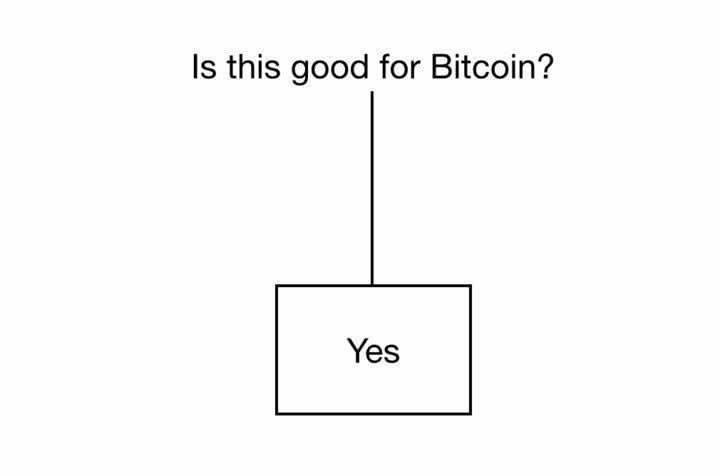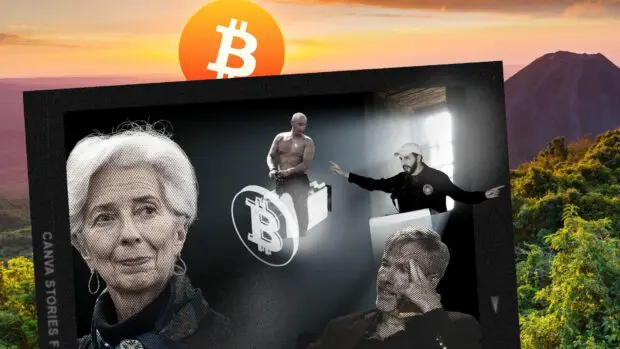The latest proposal to regulate Bitcoin and ban Proof-of-work blockchain inside the EU has caused turmoil in the bitcoin community and industry.
In this article I will try to explain why I believe it is actually a positive development.
- It’s a once-in-a-century opportunity for Switzerland, Monaco and smaller Schengen neighbors to attract the most important industry of the future: The Bitcoin industry.
- It’s a great opportunity for the UK and perhaps for other underdogs like Iceland, Estonia, Lithuania, Malta, Romania, etc to exit the EU and attract billions of capital, tax revenue, talent, and industry power.
- It’s another great opportunity for Bitcoin itself to prove its antifragility. Miners are forced to find new jurisdictions to install mining facilities. The hashrate will perhaps dip and surge a few months later, just like it did when China cracked down on mining.
- It’s a great signal for consumers (to wake the fuck up) that the EU bureaucrats do not understand Bitcoin and are not acting in the interest of taxpayers in the memberstates.
- It’s another push forward to help bitcoin grow as it usually strives during times of uncertainty, legal pressure and chaos.
- It’s another move to further erode the trust in the EU as the archaic bureaucratic monster is continuing to destroy itself and it will be a blessing for the European continent.
- It might just be a big blow as I will explain…
When in doubt, zoom out
$10.000, $4.000 or even three-digit price Tweets are of course engaging. But are we dealing with insider information or rather wishful thinking? And do we mind cheaper sats like back in the days? Wouldn’t it be a dream to come true? Would a global Bitcoin ban work like a time-machine and allow us all to join in like the OG’s (original gangsters) of 2010-2015? Would the worst case be actually the greatest opportunity?
I doubt this will happen but we should always prepare for the worst, or should I say the best?

When in doubt, zoom out. Other countries have attempted to ban Bitcoin many times. But how effective are these bans? Russia flip-flopped multiple times on its regulatory stance and recently proposed harsher regulations against mining. However, a closer look at the reality of things reveals that the government is actually involved in mining.
Mining providers like Bitiver are protected by Rosgvardiya, Russia’s state enterprise security organization. Rosgvardiya is the only security organization allowed to use automatic firearms. A similar way of involvement can be noticed in Iran, where mining is strictly limited and the government takes advantage of the prohibition. China has cracked down on the sector many times causing mining companies to relocate. But how effective was the ban on cryptocurrency, really?
The true nature of all bans, regulations, licenses, and legal frameworks is simply a prohibition of certain areas of commerce. Soviet regimes historically have a big interest in prohibition. The Regime in the GDR of East Germany banned beautiful new technology, products and free trade as it allowed people more freedoms.
Freedoms incompatible with socialist central planning. Did you know they banned color TV? The idea to ban poof-of work (PoW) is just the same.
Politicians have finally realized they wouldn’t get a job in the real world, post-hyperbitcoinization. So they have to ban the very thing that ends any form of special privileges for politicians.
We have to understand the basic social dynamics. Governments are corrupt because they are organizations made out of people. These people get attracted to positions of power because they either mislike the competition in the private sector and or because they aren’t able to achieve something solid by themselves. They depend on positions where they aren’t questioned or challenged by market feedback.
Governments are made out of people that follow their own interests and hence are corruptable. The economic effect of corruption can be either positive, negative, or neutral. However, in most cases it’s negative for consumers.
In the case of bitcoin, the EU’s agenda is pretty obvious. Bitcoin undermines the great monetary and social reset we are witnessing. With bitcoin, people can hedge the upcoming economic crisis and protect their wealth. Though, the agenda foresees to take away that wealth from people (plebs) and give everyone worthless CBDCs.
Does anyone expect any politician, central banker, or EU bureaucrat to love Bitcoin? Of course not. Their entire career and worldview depend on central planning, central authority, quantitative easing infinity , and technocratic top-down-transformation. But most importantly, without the monopoly on money, no more bailouts, no more credit expansion, no more deficit spending. Monopoly money is over. The party is over. Bitcoin is the killshot that stops the dystopian nightmare that we’re currently marching towards.
The good news is that bitcoin has already won. To ban bitcoin on a national level or supranational level is already a silly idea. Just like banning Math would be. 1+1 will always be 2, whether Christine Lagarde likes it or not.
The economic reality is that the industry has matured and grown into a multiple billion (depending how you calculate, trillion) USD ecosystem with thousands of jobs, and millions of users. The idea to easily wipe that out with a simple bill simply comes too late. Pandora’s box has been opened and there is no way to get the idea back into the box. The bitcoin economy is fortified, anti-fragile and indestructible. Oh, by the way, the bitcoin ecosystem is becoming more and more decentralized as we speak.
Bitcoin adoption has never been optional
It is all a great misunderstanding. The Bitcoin network cannot be turned of or shut down. Therefore adoption is not optional but inevitable, as Saifedean Ammous wonderfully explains in the video above.
In light of the legal tender legalization of Bitcoin in El Salvador, and trends such as legal tender discussions in Tonga and California, the opportunity already outweights the downsides for many small jurisdictions. Bitcoin has risen as a rebel, as a misfit, as a changemaker and honeybadger and it will continue to do so, take it or leave it.
Yes it’s true, central providers such as exchanges could be restricted. But would the industry comply? There are a number of very well paid executives, investors and tens of thousands of employees that would been forced to give up years of work. And by the way, all of them are just about to get started as Bitcoin probably just hovers around 1% of global adoption. Do you think they will give up their companies just so? Or would they perhaps make use of fully decentralized systems Jack Dorsey has already proposed?
I can only speculate about the different scenarios how a ban could affect the industry. Personally, I am not overly concerned. Legal pressure is nothing new. It existed always and it will exist until the ‘Great ReSAT” is completed. That the EU ship is sinking, that is a certainty known for decades.
The truth is, anything the government thinks, does or enacts is irrelevant. In Bitcoinland, code is law.
A European-wide ban of Bitcoin would not bother the Bitcoin protocol. It would only hurt consumers in the EU and ultimately fire back on member-states as it would cause big losses in tax revenue, an exodus of capital and a migration of the most important industry of the future to more welcoming regions.
My bet is that the EU is just testing the reaction, a common strategy. Ultimately they would rather tax bitcoin than ban it. A more likely outcome of this farce is the following. Ordinary people who just have a small stash on an exchange and everyone who is not well prepared, will have to pay their protection fee to the man. Just like most people are doing it for their entire life. I’m very sorry for that.
The interesting part will be how younger demographics will react. You know, those who smoke weed illegally, move around the world all day, use offshore tactics to optimize their theft-footprint (tax-footprint) and enjoy life as sovereign individuals. They know that 1 BTC=1BTC and that the corn is designed to pump forever.
I am bullish on the next generation. I would not dare to short the corn because of anything the government plans or does. I believe the corn will teach us all a lesson as it always does.
Now, please be aware that all of this is just my personal opinion and should not be taken as financial advice. I might be completely wrong and bitcoin goes to zero.
Regardless, I’d rather focus to protect my wealth instead of being afraid – how about you?
Leave me a comment on Twitter at @BitcoinNewsCom or @Satmund I am looking forward to hear your views.










